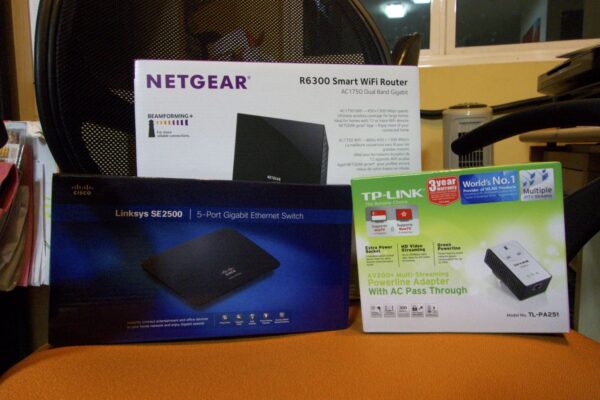
Today has been a bad “IT maintenance” day at home. There were a few things I’ve been meaning to do for some time. But knowing there’s always the risk of something going wrong, I’ve been putting it off to a day when I had a little more time. Working in IT, I know this all too well. Simple tasks can blow up into the most complex procedures. One always has to be very well prepared.
So the first task of the day was my TP-Link HomePlug powerline adapter that needed replacement. These powerline adapters are really lousy. I’ve mentioned about them before. They are pretty unstable and flakey. One of the pair I’ve had at home died. So I bought a replacement quite some time ago, but only now just got around to attempt to carry out the replacement. Guess what? Well, I discovered that the other of the existing pair has also died. No point installing the replacement then.
I’ve been told that others generally have better luck with HomePlug powerline adapters from other manufacturers. I shall make it a point to remember, never to get TP-Link stuffs again. At least not their HomePlug adapters.
Next, I wanted to upgrade my Ubuntu desktop computer to 13.10. It’s always a risk with Linux upgrades. Nothing comes close to operating system upgrades like how it is with Mac OS X. Upgrading OS X is almost like a trivial exercise.
Something just had to go wrong. My Ubuntu 13.10 upgrade hung. I was left with an unbootable system. Well, it booted past the kernel, but I guess the system was a royal mix-up of 13.04 and 13.10 stuffs.
The challenge, now, is that the Ubuntu box hosts the pfSense virtual machine that “routes” my home Internet. So with the Ubuntu box dead, my Internet is dead too. It became rather cumbersome trying to figure out how to move forward. Do I download Ubuntu to reinstall from a USB stick? Yes, I could do that, but uh, my broadband is broken now. Sure, I could reconfigure my broadband. Anything can be done. It’s just tedious.
Or, I could ditch Ubuntu and go with CentOS. I still need my broadband working. Oh well, for now, I’ll stick with Ubuntu, in the interest of minimising changes at this messy juncture.
Ubuntu 13.10 presented me the option of installing itself “alongside” my existing stuffs. Sure, that’s good. That’s what I want, and that’s quite easily done. Erm, except Ubuntu 13.10 decided that the way to install alongside my existing stuffs meant repartitioning the disk, and resize the current installation into a smaller area, in order to free up space to create a new partition for itself. Sounds clean? Yeah. But the filesystem resizing ran for over 3 hours. It would be nice for Ubuntu 13.10 to let me know it will take that long? If not that, maybe give some progress indication? That was so frustrating, sitting around waiting, not knowing what was really happening, or how much more waiting was needed.
Finally, the last bit of the Ubuntu mess was that, well, my pfSense virtual machine was no longer working. Alright, I could have saved myself a lot of trouble had I documented in detail how my old Ubuntu was configured. Basically Ubuntu 13.10 did not “upgrade” itself. It simply shoved the existing setup aside and gave me a spanking new, but broken, installation.
*sigh*
I shall share about the pfSense mess up another time. It’s getting late and my wireless is still broken.
My first rule of thumb: Never buy TPlink for critical infra.
Seems like a terrible idea to run a full-fledged OS as a hypervisor to critical software like pfSense.
I do the same (virtualize pfSense) but on VMWare ESXi instead. ESXi is so bare metal that even the management userspace is completely virtualized, and I pass all critical parts (RAID card, …) via VT-d to their respective hosts.
Also, if you need anything to not break with Ubuntu LTS, stick with the LTS release and don’t attempt to dist-upgrade (or use a sane distribution like Debian).
CentOS is worse than Debian (and probably Ubuntu) for any modern person because the EL repositories get so old that many new packages break (I even had trouble installing ntop/ntopng because the official kernels were too old for the packet filter modules)
Also, there isn’t a decent homeplug. There’s no replacement for good ol’ Cat5E, or MOCA if you really have to.
Yeah, I had the same problems with Home Plugs and ditched them and ran ethernet like everyware. Also why are you using Ubuntu as VM Host to run Pf sense? Why not use ESXi? or dedicated? (if you have the space)
I have pfSense on a dedicated mini-ITX now. 🙂 It was on a Ubuntu host because I already had it around, it was the least amount of work.